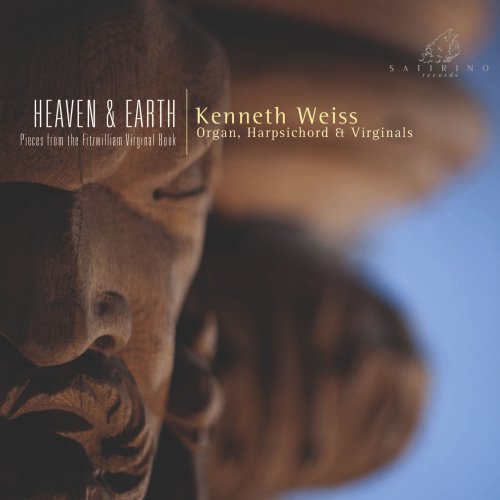
Kenneth Weiss - Heaven & Earth (2013)
BAND/ARTIST: Kenneth Weiss
- Title: Heaven & Earth
- Year Of Release: 2013
- Label: Satirino Records
- Genre: Classical
- Quality: flac lossless (tracks)
- Total Time: 01:04:36
- Total Size: 347 mb
- WebSite: Album Preview
Tracklist
01. Heaven and Earth (organ)
02. Daphne (Virginals "Mother and Child")
03. In Nomine XXXVII (organ)
04. Pavana Chromatica (Mrs. Katherin Tregians Paven, harpsichord)
05. Fantasia (harpsichord)
06. In Nomine CXIX (organ)
07. Walsingham (harpsichord)
08. His Humour (Virginals "Mother and Child")
09. Can Shee (Virginals "Mother and Child")
10. Corrãto (Virginals "Mother and Child")
11. A Gigge (Doctor Bull's my selfe) (Virginals "Mother and Child")
12. A Toye (Virginals "Mother and Child")
13. The Duke of Brunswick's Alman (Virginals "Mother and Child")
14. Almand (Virginals "Mother and Child")
15. Pavane / Variation, Galiarda / Variation (harpsichord)
16. Felix Namque (organ)
The early history of the so-called Fitzwilliam Virginal Book is obscure. It was probably compiled in the 1610s, and it was not given the "Virginal Book" title until later; in all likelihood the music included was intended for a variety of keyboard instruments, or indeed could have been played on more than one instrument. That's the rationale for this release by American-born keyboardist Kenneth Weiss, who plays organ, harpsichord, a unique instrument known as the mother-and-child virginals (with a second virginal housed in a drawer of the larger instrument, and in a few pieces here played at the same time), and finally a claviorgan, which isn't much heard in recordings of English keyboard music but was a common home instrument from the 16th century to the 18th and may be worth the price of admission here all by itself. Weiss' intent seems to be to show the stylistic breadth of the collection, and once you get over the surprise of lurching from one instrument to another, which is something you wouldn't have heard in a concert of the period, he's actually successful. In addition to small dances, ornamented vocal pieces like the graceful anonymous Can shee excuse (track 9), and the wildly experimental music of John Bull, there are substantial works by a pair of composers generally not included in English Renaissance keyboard compilations: Thomas Morley and Thomas Tallis, whose concluding ten-minute Felix namque is a massive fantasy that demands quite a bit from the keyboardist. The preceding multisectional piece by Fernandino Richardson is also an unusual piece that shows a rare example of an English keyboard composer thinking in larger dimensions. This album is aimed largely at those familiar with this style, but it's lively and fresh for anyone.
01. Heaven and Earth (organ)
02. Daphne (Virginals "Mother and Child")
03. In Nomine XXXVII (organ)
04. Pavana Chromatica (Mrs. Katherin Tregians Paven, harpsichord)
05. Fantasia (harpsichord)
06. In Nomine CXIX (organ)
07. Walsingham (harpsichord)
08. His Humour (Virginals "Mother and Child")
09. Can Shee (Virginals "Mother and Child")
10. Corrãto (Virginals "Mother and Child")
11. A Gigge (Doctor Bull's my selfe) (Virginals "Mother and Child")
12. A Toye (Virginals "Mother and Child")
13. The Duke of Brunswick's Alman (Virginals "Mother and Child")
14. Almand (Virginals "Mother and Child")
15. Pavane / Variation, Galiarda / Variation (harpsichord)
16. Felix Namque (organ)
The early history of the so-called Fitzwilliam Virginal Book is obscure. It was probably compiled in the 1610s, and it was not given the "Virginal Book" title until later; in all likelihood the music included was intended for a variety of keyboard instruments, or indeed could have been played on more than one instrument. That's the rationale for this release by American-born keyboardist Kenneth Weiss, who plays organ, harpsichord, a unique instrument known as the mother-and-child virginals (with a second virginal housed in a drawer of the larger instrument, and in a few pieces here played at the same time), and finally a claviorgan, which isn't much heard in recordings of English keyboard music but was a common home instrument from the 16th century to the 18th and may be worth the price of admission here all by itself. Weiss' intent seems to be to show the stylistic breadth of the collection, and once you get over the surprise of lurching from one instrument to another, which is something you wouldn't have heard in a concert of the period, he's actually successful. In addition to small dances, ornamented vocal pieces like the graceful anonymous Can shee excuse (track 9), and the wildly experimental music of John Bull, there are substantial works by a pair of composers generally not included in English Renaissance keyboard compilations: Thomas Morley and Thomas Tallis, whose concluding ten-minute Felix namque is a massive fantasy that demands quite a bit from the keyboardist. The preceding multisectional piece by Fernandino Richardson is also an unusual piece that shows a rare example of an English keyboard composer thinking in larger dimensions. This album is aimed largely at those familiar with this style, but it's lively and fresh for anyone.
As a ISRA.CLOUD's PREMIUM member you will have the following benefits:
- Unlimited high speed downloads
- Download directly without waiting time
- Unlimited parallel downloads
- Support for download accelerators
- No advertising
- Resume broken downloads


